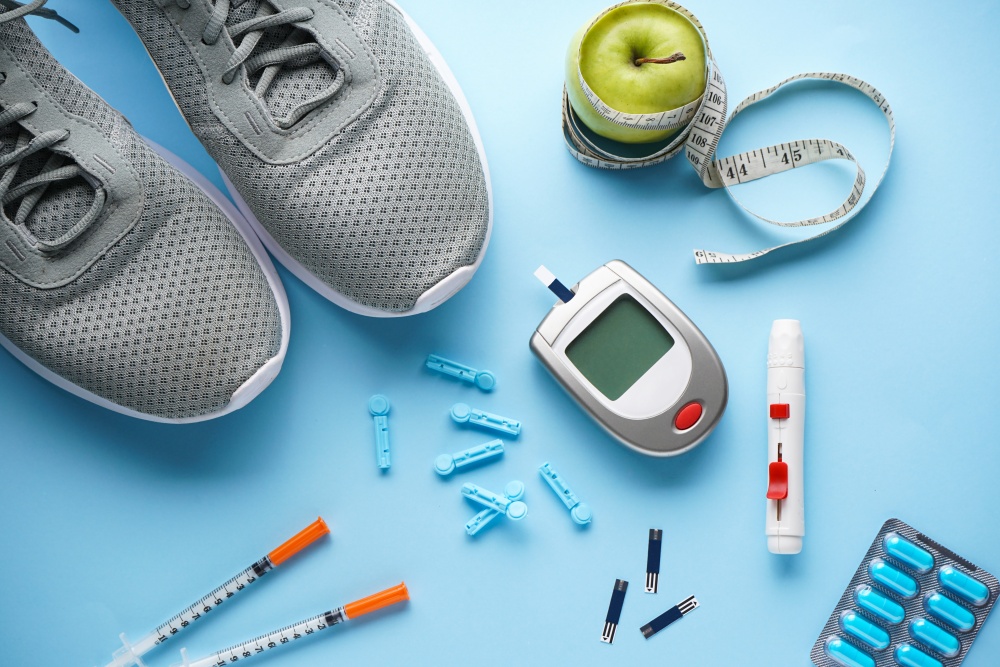Over 537 million people around the world live with diabetes. The condition affects a whopping 10.5% of the adult population, and there’s no denying how difficult it can be to manage it.
One day, you’re living life to the fullest—eating your favorite cake, regularly enjoying sugary treats, and tantalizing your tastebuds with processed and fried foods. And very quickly, you find yourself fighting tooth and nail to maintain your old routines.
It can be difficult to feel “normal” when forced to always make the right food choices, constantly check your blood sugar levels, and take various medications to stay healthy.
It may feel like your life has turned upside down, which can lead to stress.
How Does Stress Affect Diabetes?
When diabetes is a part of your life, it’s common to feel negatively about it.
There’s a name for it, too: diabetes distress. This affects 33% to 50% of people with diabetes.
The problem typically starts upon the official diagnosis, which brings feelings of distress and frustration from having to keep up with your new life — one filled with tests, meds, and other challenges. Factor in not knowing enough about your condition, which can lead to extended periods of stress.
During times of stress, your body sees a 9x increase in average cortisol levels, which makes it hard for insulin to do its job, further increasing blood sugar. It may also cause excess abdominal fat. Other stress diabetes symptoms include headaches, muscle pain or tension, issues with sleep, and fatigue. All of this is on top of feeling unmotivated, irritable, angry—just about every negative feeling under the sun.
But does diabetes get worse with stress?
Unfortunately, yes.
While negative emotions, thoughts, and mood swings are entirely normal, it’s essential to manage them. Otherwise, they may lead to unhealthy behaviors and coping mechanisms, making glycemic control even more difficult.
Over time, it may also lead to a heart attack, stroke, or eye, kidney, and nerve damage.
How Can a Diabetic Manage Stress? 6 Tips for Healthy Living
Exercise
Physical activity stimulates the production of endorphins—the “feel-good” chemical that promotes pleasure and acts as a stress reliever.
It also brings many other health benefits, including aiding in weight management, reducing your risk of cardiovascular diseases, type 2 diabetes, and several common cancers, strengthening bones and muscles, managing chronic health conditions, improving sleep, and lowering the risk of premature death.
And the best thing is that there is no single best exercise you should do. You can try just about any physical activity to keep stress at bay and improve your overall health.
Here are some effective exercises to try:
- High-intensity aerobic exercises
- Kickboxing
- Long-distance on-road activities, like biking
- Pilates
- Tai Chi
- Team sports
Listen to Music
Music can be a therapeutic tool in your fight against stress.
However, no two genres are created equal; some are better for stress relief than others. Songs with 60 beats per minute cause alpha brain waves, a slow pattern that induces feelings of calm. Listen to these songs for 45 minutes, and you might find yourself on the way to dreamland.
In contrast, upbeat music makes you feel alert and increases dopamine production in your brain and endorphin levels in your blood. This can help make you feel more optimistic about life.
Practice Relaxation
Relaxation exercises are surprisingly effective at keeping stress at bay.
Here are some science-backed techniques you can try:
- Deep Breathing: Deep breathing exercises increase the supply of oxygen to the body and signal the nervous system to calm down, thereby improving mood and stress.
- Meditation: Meditation interventions root you in the present and away from what-has-beens and what-could-bes. Practicing this for a few minutes a day can significantly reduce cortisol levels.
- Progressive Muscle Relaxation: This exercise entails tensing and relaxing each muscle, using the mind-body connection to reduce stress and anxiety.
- Yoga: Yoga exercises are a jack of all trades and a master of them all, promising relief from stress, anxiety, and depression.
Pick Up A Hobby
Nearly 75% of participants witnessed a drop in levels of cortisol after a 45-minute art-making session where they were given the get-go to create their imagery of choice.
So, even if you’re not an artist, you can still benefit from this phenomenon.
Or, you can choose a hobby that you already enjoy. The idea is to distract your mind from worrisome thoughts, unwind, and bring fun back to your life.
Here are some things you can indulge in:
- Dancing: It provides direction and releases a vast amount of opiate beta-endorphins, offering stress relief and pain management.
- Gardening: It can reduce acute stress endocrine biomarkers and boost mood.
- Hiking: It gives you a whole body workout (bonus points for physical fitness), calms anxiety, and reduces rumination, aka obsessing over your thoughts.
- Knitting: It is a soothing experience that can calm your body and brain.
- Reading: It lowers your heart rate, eases muscle tension, and increases relaxation, with a 2009 study showing it can reduce stress by 68%.
Build A Support System
The benefits of having a support system cannot be overstated. According to a 2007 study, rich and functional support systems can do the following:
- Reduce genetic risk for mental illness, even when stressors are present
- Increase resilience to stress
- Decrease functional impairment in those with depression
- Increase the likelihood of recovery
- Lower risk of developing PTSD
- Reduce stress-induced cortisol release
If you have difficulty coping with diabetes-related stress, it will pay to attend a diabetes support group or create an informal setup with your friends and family members to relieve some of your burdens.
After all, 1 in every 4 to 5 people with diabetes deals with diabetic distress. There is no shame in taking all the help you can get for your continued well-being.
Stay Optimistic
Dealing with diabetes isn’t easy. It puts you through a rollercoaster of emotions, to the point where you’re 2-3x more likely to develop depression than non-diabetics. So, be mindful that the odds are stacked against you but still believe you can come up winning.
You may experience some setbacks—that’s perfectly natural. Don’t beat yourself about it. Pick yourself back up, dust yourself off, and keep going. Set attainable goals, be consistent in your efforts toward better health, and you will be alright.
When To Seek Professional Help
Life with diabetes can feel overwhelming—but it doesn’t have to stay that way.
These techniques can work, but if you still have a hard time managing your emotions, reach out to your healthcare team.
They know all about diabetes distress and can help put things into perspective. They’ll give you practical tips on lifestyle modifications and refer you to other professionals, like a psychologist, who can provide a safe space to release the thoughts and feelings plaguing your mind. This could help make your condition feel less burdensome.
Other Articles You Might Be Interested In:
The Miracle of Faith: How It Can Help You Live Longer
“Religion” gets criticized and mocked, but nobody (not even science) can deny it can be good for you. For starters, a study of more than 1,500 newspaper obituaries from across the U.S. shows it can help you live 9.45 years longer than non-spiritual folks. But this...
Looking at the Bright Side: How Optimism Can Help You Live a Longer, Healthier Life
Are you a glass-half-full kind of person? If you are, then you’ll love what this article has to say about its impacts on health. If you struggle to look at the brighter side of things, this could be a sign that it’s time for a change. According to a clinical...
What You Should Know About Sensorineural Hearing Loss
Hearing loss affects millions of people around the globe. According to the World Health Organization (WHO), it is experienced by almost 20% of the entire population! There are three types of hearing loss, but more than 90% are attributed to sensorineural hearing loss....
A Beginner’s Guide to Tai Chi: Benefits & More
Tai chi, also known as shadow-boxing, is a mind-body exercise developed by the Chinese as a “soft” martial art in the 17th century. This low-impact workout involves slow, intentional movements and deep breaths to achieve a meditative state of mind. It makes you...
Understanding Food Cravings, Their Triggers, and How To Manage Them
We’ve all been beset by food cravings at some point in our lives, but most of us don’t really know where they come from or how to resist them. Since cravings are associated with higher body mass indexes, it has become more important than ever to understand the science...
Mindful Eating: The Moment-to-Moment Experience That Improves Your Quality of Life
Do you watch television or talk to a loved one over text while you eat? Time and again, cognitive science has proved that the human mind is incapable of performing two or more tasks at once. But, living in today’s modern, fast-paced world, we barely notice when we’re...
Want Healthy, Glowing Skin? Try Dry Brushing
Though dry brushing is a comparatively new trend in the skincare world, it has amassed an impressive 130.5 million views on TikTok under a hashtag by the same name. Gwyneth Paltrow and Miranda Kerr are fans of the beauty ritual which speaks of its popularity. As for...
Why You Should Laugh Your Way to Health
The quote, “Laughter is the best medicine,” has more truth to it than you realize. Humor skills or habits—having a propensity to laugh, the enjoyment of humor, the ability to laugh at oneself—are some of the main signature strengths one can possess. In fact, the...
12 Clever Ways To Healthy Eating on a Budget
Inflation and supply-chain disruptions have caused food prices to shoot up more quickly than in previous decades, making every trip to the grocery a costly and tricky affair. Despite the fact that food has become more expensive than ever, the federal minimum wage...
Volunteering: How Helping Others May Impact Overall Health
Volunteering is a pro-social behavior. It’s dedicating your time, attention, and resources toward helping people who are facing hardships in your community with no expectation of any reward or compensation. But there is something in it for you after all. Volunteering...











